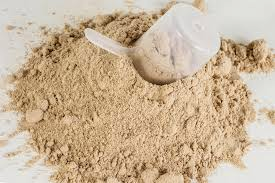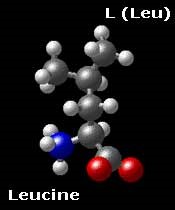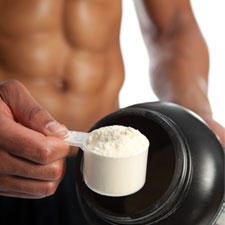Protein powder has been increasingly getting popular among gym enthusiasts as a nutritional supplement. If you go to a gym, you might notice that some of them are shaking and drinking this protein shakes after working out. And some are talking about where to get this protein shakes.
Image from http://onf.coop/protein-powders-101/
Nowadays you can easily buy protein powders in supplement store and over the internet. What is protein powder actually? Is it only for bodybuilders or anyone can take it as part of daily nutrition?
What are protein powders?
It comes in various forms. The three common ones are whey, soy and casein protein. Whey is the mostly used because it is a water-soluble milk protein. It is also a complete protein because it has all of the nine amino acids essential for human needs. Foods like meats, dairy, and eggs are complete protein. On the other hand, most vegetables, rice and starches are not complete proteins because they are missing one or more of the essential amino acids.
It’s actually a by-product from making cheese. Once separated from the cheese ingredients, the remaining whey goes through a purification process and gets dried to powder form. The Whey Protein Institute calls it the “gold standard” of protein because it helps athletes develop a lean, well-defined physique.
One key amino acid is leucine, which play a vital role in promoting muscle building and growth. When you take this protein powders and train your muscles, the combination gives your body important amino acids that help your muscles strengthen and grow over time. Not only do foods have different amino acid profile, but the rate at which the protein is absorbed by the body can vary. Whey protein just so happen to have the highest score possible with a Biological Value (BV) which is the parameter measuring protein absorption. This means that it contains all the amino acids needed to make a complete protein and is easily digested by our body.
Image from www.biology.arizona.edu
Specific amino acids are used by your body for specific reasons. For instance, whey protein is high in Branched-Chain Amino Acids (BCAA’s), which are 3 of the 9 essential amino acids that are of special importance for muscle repair and preservation. In both exercise and during recovery, your body will break a small amount of BCAA’s for fuel (1-5%). Although this is a small percentage overall, your body will break down muscle in order to get those BCAA’s. By providing the body with a high amount of BCAA’s, your body preserve your muscle, while leucine actually stimulates protein synthesis.
Whey and Muscle Building
There is a good evidence whey protein increases muscle mass and muscle strength. Athletes, including body builders, favor whey protein powder for this reason but research has shown that it’s beneficial for everyone. However, you can also get everything they offer by eating sources of lean protein like meat, fish, chicken and dairy products. Think of protein powder as a form of chicken breast in a powder form that is faster to digest.
Image from www.born fitness.com
There are a few reasons why teen might want to take them:
- When you’re a starting a program – if workout is a new thing to you, you might need more protein
- When you’re growing – a teenager needs more protein to fuel his workouts because his body is still growing and need more than usual requirements.
- When you’re increasing intensity of workouts – if you decided to increase the intensity of your workout, definitely your body will need more protein.
- When you’re recovering from injury – athletes with sport injury will need more protein to build up back the injured part.
- If you’re becoming a vegetarian – vegetarian lacks of protein from common sources in their diet.
Before or After Workout?
Usually people will take protein before their workout starts. This will helps increase protein synthesis by having protein available when blood flow to the muscle starts to increase through working out. That blood then gets more protein to deliver as needed throughout your body, and you will develop more muscle mass and increase your strength. However, some researchers suggest taking it after your workout, as it will increase your muscle cell size. The only time you would want to take is within 30 to 60 minutes after your strength training workout.
Image from nasnutrition.com
How much is enough?
The Centre for Disease Control and Prevention (CDC) says adult need between 46 and 56 grams of protein per day. Men need slightly more than women. The Institute of Medicine recommends that between 10 and 35 percent of your total calories come from protein. Most studies have suggested taking 1.2 grams of protein per kilogram of body weight. If you are thinking of taking protein in supplement, do consult with your doctor or nutritionist.
While no supplement can replace a diet of whole, natural, unprocessed foods, whey protein can be useful for people with a very busy, on-the-go lifestyle as a supplement to their normal diet.
Image from www.gll-getalife.com
Whey protein types
There are few types of whey protein:
1. Whey Protein Concentrate (WPC) – generally the cheapest, has the lowest protein content (55% – 89%).
2. Whey Protein Isolate (WPI) – more expensive than concentrate, average 95% protein and the rest is made up of fat, lactose and various immunoglobulins.
3. Whey Protein Hydrosylate (WPH) – most expensive of the three, 99% protein, quickly absorbed and generally worst tasting.
Is there risk of taking whey protein?
Generally most of the complications associated with whey protein intake have to do with digestive system such as:
- gas
- bloating
- headaches
- cramps
- fatigue
None of these are generally considered life-threatening, more so than annoying complications. Most of the literature has shown that if you’re experiencing any of these symptoms, they are most likely due to either lactose (found more in Whey Protein Concentrate) or sweeteners used more so than the whey protein itself.
The biggest fear always expressed about whey protein intake is that too much protein is “bad for the kidneys”. Research has shown that this is not true in all healthy individuals. However, persons with kidney problems can worsen their pre-existing conditions. Healthy individuals, without any underlying disease have nothing to worry about higher protein intake if taken according to the recommended dosage.
References:
- www.livestrong.com
- www.wikihow.com/Build-Muscle
- www.builtlean.com
- www.webmd.com/vitamins-and-supplements
| Last Reviewed | : | 28 August 2020 |
| Writer | : | Lt. Kol. Dr. Ridzuan bin Azmi |
| Accreditor | : | Dr. Nik Rubiah binti Nik Abdul Rashid |
| Reviewer | : | Dr. Nazhatussima bt. Suhaili |











